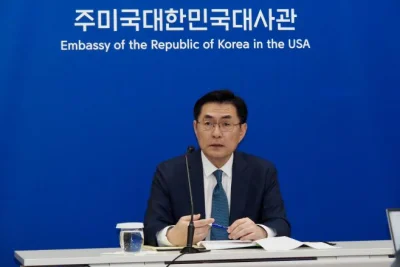U.S. reaffirms openness to talks with North Korea, Seoul says

Jeong Yeon-du, South Korea’s chief nuclear envoy, speaks during a briefing with reporters at the South Korean Embassy in Washington on Wednesday. Photo by Asia Today
Feb. 27 (Asia Today) — The United States has reaffirmed that it remains open to dialogue with North Korea without preconditions, South Korea’s chief nuclear envoy said Thursday, as Washington also reiterated its longstanding policy stance.
Jeong Yeon-du, director-general for strategy and intelligence at the Foreign Ministry, told reporters in Washington that he confirmed during meetings with senior U.S. officials that “the U.S. position of being open to dialogue with North Korea without preconditions remains unchanged.”
Jeong said he met with senior State Department officials, including Allison Hooker, Thomas DiNanno and Michael DeSombre, as well as congressional figures and Korea experts at major think tanks during his visit, which began Monday.
He said the two sides exchanged views on recent developments on the Korean Peninsula, including the outcome of North Korea’s ninth Workers’ Party Congress, and discussed pending issues based on the joint explanation released after the summit between President Lee Jae-myung and U.S. President Donald Trump last October in Gyeongju.
Jeong said Seoul explained its plan to continue supporting early resumption of U.S.-North Korea dialogue and to pursue long-term efforts to ease inter-Korean tensions and build trust, while adhering to the principle of denuclearization.
A White House official delivered a similar message this week in response to remarks by Kim Jong Un suggesting conditional willingness to improve ties with Washington.
“U.S. policy toward North Korea remains unchanged, and President Trump remains open to dialogue with Kim Jong Un without any preconditions,” the official said, recalling that Trump held three summits with the North Korean leader during his first term.
The statement was interpreted as reaffirming Washington’s twin positions: openness to talks without preconditions and continued pursuit of the complete denuclearization of the Korean Peninsula.
Kim recently said Pyongyang would maintain a “strongest stance” toward the United States but added that if Washington respects North Korea’s “current status” and withdraws what it calls a hostile policy, there would be no reason the two sides could not get along. His remarks were widely seen as a demand for recognition of North Korea as a nuclear state.
Despite the stated openness to dialogue, a senior South Korean government official said there are no new developments such as working-level contacts between Washington and Pyongyang. The official added that while the United States continues to signal it is open to talks, it does not appear to have moved to concrete preparatory steps.
Jeong said Seoul and Washington agreed to maintain close coordination through frequent communication at various levels. He also said he explained South Korea’s phased denuclearization proposal and listened to views in U.S. policy circles regarding North Korea.
Trump met Kim in Singapore in June 2018, in Hanoi in February 2019 and at the inter-Korean border village of Panmunjom in June 2019. While the first summit produced a joint statement on new bilateral relations and denuclearization, subsequent talks failed to yield an implementation agreement, and substantive negotiations have remained stalled.
— Reported by Asia Today; translated by UPI
© Asia Today. Unauthorized reproduction or redistribution prohibited.
Original Korean report: https://www.asiatoday.co.kr/kn/view.php?key=20260227010008277
